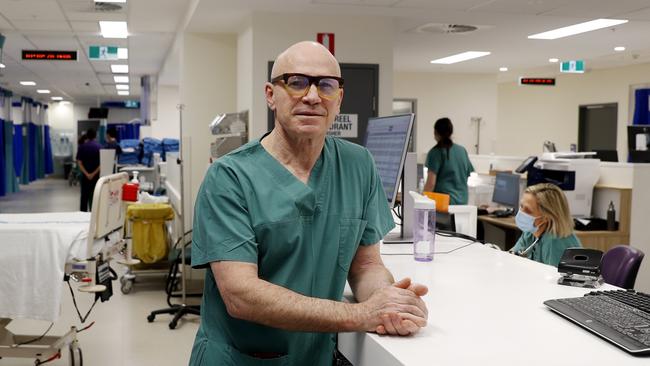Budget 2020: In the ‘red zone’, doctor sees Covid mental health war
If the coronavirus pandemic has highlighted anything about Australia’s healthcare system, it’s the severe lack of funding in the mental health space, says Dr Paul Preisz.

If the coronavirus pandemic has highlighted anything about the gaps in the healthcare system, it’s the severe lack of funding in the mental health space, according to Paul Preisz.
The 62-year-old from Sydney has been working on the COVID-19 frontline throughout 2020 as the medical director of St Vincent Hospital’s emergency ward and has observed that, during a crisis, “it’s the most vulnerable people who suffer the most”.
On Tuesday night, Dr Preisz said it was a “great thing” the Morrison government had doubled the number of Medicare-funded psychology sessions available to Australians each year, as a direct response to the metal health crisis spurred by the COVID-19 pandemic.
“Everyone’s now seeing that is a reality, that there is a lot more need for mental health services out there than we expected and COVID has put that into sharp focus,” Dr Preisz said.
“We’ve seen some terrible things during this pandemic in terms of poor mental health outcomes — the spate of teen suicides, people in real distress — and we really need to think about that. It’s an area that for a long time we’ve realised we need to do more, and now is the time.”
He said the doubling of rebated psychology sessions from 10 to 20 per year was “ a great thing’’ but said “whether that in itself is going to have a big impact, we’ll have to see’’. “There’s so much to mental health and we were quite a far way behind in how we funded it that we’re still catching up, but it’s a great thing to see that they’re finally recognising it.”
Dr Preisz said the federal budget did not contain enough to address the drug and alcohol issues that have also arisen as a result of the pandemic.
“I’d love to see more in (that) space; especially for young people, there seems to be a big crossover between drug and alcohol and mental health and the need for combined services and management is really high,” he said.
“I really feel for young people who are trying to seek help but are on long waiting lists, particularly if they’re not privately insured.”
Dr Preisz said prior to the pandemic about 10-15 per cent of St Vincent’s emergency department patients were treated for mental health or drug and alcohol issues, but that number had doubled since March.
“There are very few facilities or options for people struggling with drug and alcohol abuse, particularly if they don’t have private healthcare, so I would be very excited to see improved access to rehabilitation,” he said.
“We also see the criminal justice system flooded with people with mental health issues or drug/alcohol abuse problems, and that isn’t being addressed as well as it should, but a little investment could go far.”
Dr Preisz said St Vincent’s would also benefit from increased funding for Aboriginal health. He acknowledged that, regardless of politics, whoever was in government this year had a “tough job and they’re doing a very good job considering what they’re up against”.
Having worked in healthcare his entire career, he said nothing has altered the way he worked as significantly as the pandemic.



To join the conversation, please log in. Don't have an account? Register
Join the conversation, you are commenting as Logout